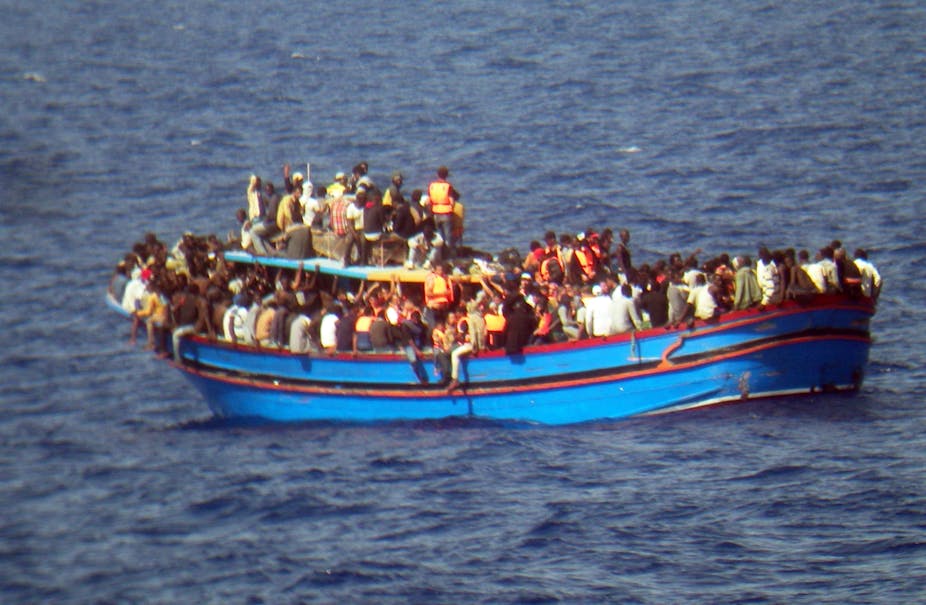Thirty lifeless bodies found in the bow of a fishing boat carrying 600 migrants off the coast of Sicily have reignited the debate on illegal crossings in the Mediterranean and how the EU should respond. The Italian navy is facing an unprecedented flow of migrants across the sea, with the number intercepted in first half of 2014 already outnumbering those of the past year and at levels seen in 2011 during the Arab Spring.
To offset the moral panic that pervades this debate, it would be useful for everyone involved to remember that the high number of interceptions is not per se an indicator of an increasing number of illegal crossings and even less and indication of the number of irregular migrants in the EU. While a correlation can’t be categorically denied, the relationship may be less direct that many assume.
It is evident that the militarisation of the Mediterranean and the increasing patrolling of the sea by European navies, drones and satellites following the political turmoil and regime change in Libya, Egypt and Tunisia have had an impact on the likelihood of a migrant boat being detected. (This is not to deny the impact of weakened control on exit in countries such as Libya since the fall of the Gaddafi regime.)
The rise of FRONTEX
The reinvigorated action of FRONTEX, the European Agency for the Management of External Borders, has also contributed to the phenomenon. By feeding politicians and media with detailed statistics, first-hand accounts, close-up images, and scrupulously documented annual reports, FRONTEX has given an EU-wide profile to what used to be seen as a local, sporadic phenomenon.
Making illegal crossings a European, rather than a national, “problem” can serve multiple agendas. It can promote a sense of EU solidarity currently under threat by the re-emergence of nationalist discourses from Eurosceptic parties.
At a more basic level, it helps FRONTEX demonstrate value for money to the governments that have been generously funding the agency in the past few years. The organisation’s budget has rocketed from €6.3m in 2005, to nearly €42m in 2007, topping €94m by 2013. The newly appointed president of the European Commission, Jean-Claude Juncker has named a further budget increase as one of his top priorities.
Mare Nostrum
The current upsurge of interceptions also has a more specific cause: operation Mare Nostrum (Our Sea, in Latin). This is a rescue and military operation led by the Italian navy, launched in October 2013 in response to the tragic deaths of more than 360 people after a migrant boat sank off the coast of the Italian island of Lampedusa. International outcry and the direct intervention of Pope Francis I, who declared the event a “disgrace”, provided the impetus for the Italian government to intervene.
Thousands of migrants brought to safe shores in the past months certainly make Mare Nostrum a “great humanitarian success”, as recently pointed out by the UN High Commission for Refugees. But there are signs that the political consensus around the operation is vacillating, with many saying the operation provides an incentive for migrants to take the sea route to Europe.
After hundreds of interceptions at sea, a change of government and the start of summer, which always brings more arrivals, political support for the operation is deteriorating. The Northern League, lately joined by Berlusconi’s Forza Italia, routinely attacks Mare Nostrum, most notably accusing the government of letting in migrants who spread diseases and, lately, attacking the prime minister for having migrants’ blood on his hands.
The government continues to defend Mare Nostrum publicly, but ministers are increasingly questioning the long-term sustainability of this kind of humanitarian operation, and repeatedly call for the EU to take responsibility. They argue the Mediterranean is “a European border”, not simply an Italian one.
The Mediterranean is an EU border
A running cost of more than €9m a month is not the only concern for the Italian government. Overcrowded reception facilities pose security and health hazards, but the real question is: what next? What to do with the thousands migrants brought to the shore?
An initial screening of the arrivals shows that more than 80% had the prerequisites for applying for asylum. But even if they are recognised as refugees, the Italian state has not much to offer to them. Many will survive in destitution in Italian cities or move to other EU countries to join family members or go off in search of better economic opportunities and more generous welfare systems.
So it’s hardly surprising that Italy has indicated an EU-wide immmigration policy as a priority for its presidency of the Council of the European Union.
The Mediterranean is indeed an EU border, not least because it is the EU (Italy included) that those crossing the sea on rickety boats dream of reaching. It is in the EU and what they think it stands for that they are seeking refuge and the chance to create a better, safer life for themselves and their families. Sadly, at a time of nationalist resurgence, the call for a fully European response may fall once again on deaf ears.

